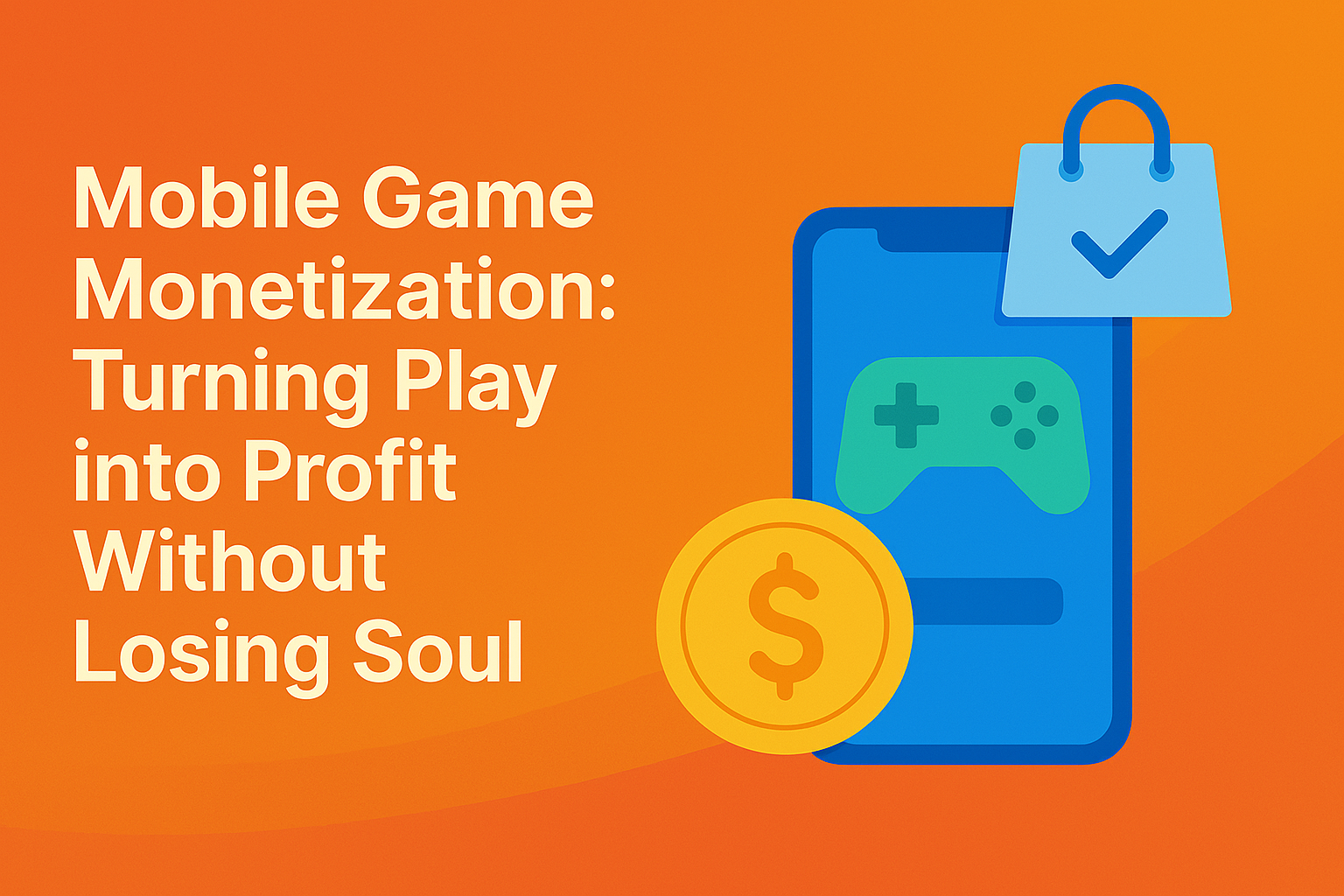Mobile Game Monetization: Turning Play into Profit Without Losing Soul

Strong 8k brings an ultra-HD IPTV experience to your living room and your pocket.
The mobile gaming industry isn’t just thriving—it’s dominating. Billions of users across the globe spend countless hours immersed in puzzle adventures, battle royales, and cosmic strategy quests. But behind the pixelated magic lies a pressing question for developers, marketers, and creators alike: How do we monetize our mobile games effectively—without alienating the players who love them?
Welcome to the art and science of mobile game monetization.
This blog dives deep into the models, mindset, and mechanics behind making money with mobile games while preserving user experience and engagement. From classic pay-to-play options to innovative spiritual storytelling strategies, let’s explore how passion and profit can exist in harmony.
🎯 What Is Mobile Game Monetization?
At its core, mobile game monetization refers to the strategies and systems used to generate revenue from a mobile game. This includes everything from charging a one-time fee for downloads, running ads, selling in-game items, or offering premium subscriptions.
But it’s not just about setting up payment options—it’s about creating a balanced ecosystem where players feel rewarded, not exploited.
Monetization only works when users feel emotionally connected, entertained, and respected. That’s where smart design and ethical thinking come in.
📈 The Rise of the Mobile Gaming Economy
Let’s step back and look at the numbers.
Mobile gaming now accounts for nearly half of the global video game revenue. With platforms like Android and iOS offering easy access, billions of users now treat gaming as a daily ritual—not just a hobby.
The microtransaction model popularized by blockbuster games has made “free-to-play” a dominant strategy. But “free” doesn’t mean creators don’t earn. On the contrary, some of the highest-grossing games are technically free to download.
So how does that happen?
🔥 Popular Monetization Models
Let’s break down the most common monetization strategies used in mobile games:
1. In-App Purchases (IAP)
This is one of the most widely used methods. Players can purchase virtual items, currency, power-ups, cosmetics, or energy boosts to progress faster or personalize their gameplay.
The magic lies in microtransactions: small, affordable purchases that feel optional but are emotionally resonant. A player may spend $1 to revive their hero instantly, $5 for a rare item, or $20 on an exclusive seasonal bundle.
Key to success: Offer value without turning the game into “pay-to-win.”
2. In-App Advertising
This monetization technique allows developers to earn revenue by showing ads within the game. Options include:
- Banner Ads: Passive income without disrupting gameplay.
- Interstitial Ads: Full-screen ads that appear between levels or scenes.
- Rewarded Ads: Players voluntarily watch ads to earn in-game rewards (like coins or boosts). This model is surprisingly effective—it offers choice and value simultaneously.
When used respectfully, ads can generate substantial income while preserving player satisfaction.
3. Subscription Models
Instead of one-time purchases, some games offer monthly or annual subscriptions. These unlock premium content, exclusive items, or ad-free experiences.
This model promotes long-term engagement and stable revenue. Think of it like Netflix for mobile games—but with fantasy kingdoms and cosmic battles.
4. Premium Downloads
Though less common today, some developers charge a one-time fee for full access. These games usually promise a high-quality, ad-free experience right from the start.
Perfect for niche, story-driven games or educational/spiritual apps that prioritize depth over scale.
🧠 Psychology Behind Monetization
Successful mobile game monetization isn’t built on trickery—it’s built on understanding human behavior.
Players engage with games to relax, escape, compete, connect, and grow. When monetization aligns with these emotional needs, it feels natural and rewarding.
Here are key psychological triggers that ethical monetization taps into:
- Scarcity: Limited-time offers create urgency.
- Status: Exclusive skins or badges offer prestige.
- Progression: Faster advancement through paid tools or upgrades.
- Reciprocity: Rewarded ads give users something valuable in return.
- Autonomy: Offering choices enhances satisfaction and ownership.
The best games make players feel empowered, not pressured. That’s when monetization becomes a service—not a sales pitch.
🛠️ Tools and Technologies That Support Monetization
With the rise of analytics, personalization, and AI, mobile monetization has become more strategic than ever. Platforms like Unity, Google AdMob, and Facebook Audience Network help developers implement monetization seamlessly.
Key features include:
- Dynamic ad placement
- A/B testing for pricing
- Behavioral segmentation
- Real-time revenue dashboards
For creators aiming to blend spirituality or motivation into their game, these tools can even help track engagement with specific stories, teachings, or meditative features—valuable data for refining both impact and monetization.
🧘♂️ Monetization with Meaning: A Spiritual Lens
Aditya, since you’re rooted in spiritual storytelling and motivational content, here’s a perspective that harmonizes your approach with monetization:
Imagine creating a mobile game inspired by Gautam Buddha’s path to enlightenment or Paramhansa Yogananda’s teachings. The player embarks on a transformative journey, solving moral puzzles, making mindful choices, and leveling up through karma points.
Monetization here could be:
- Unlocking deeper spiritual chapters via a low-cost subscription
- Offering serene soundscapes or guided meditations as premium add-ons
- Selling symbolic items (like lotus flowers or mantras) that enhance gameplay and emotional connection
In such a game, monetization isn't just a mechanism—it becomes a meaningful offering. Players aren’t paying for power—they’re supporting peace, growth, and wisdom.
This isn’t just profitable—it’s purposeful.
🌍 Global Trends and Cultural Considerations
Not all markets respond the same way to monetization. For instance:
- Western audiences often embrace IAP and subscriptions.
- Asian markets, especially in India and China, lean toward rewarded ads and local pricing models.
- Middle Eastern regions may prefer one-time purchases or personalized bundles.
Understanding regional expectations—and respecting cultural norms—is crucial. Offering Hindi language support, localized payment options, or mythological themes can drive deeper engagement with Indian audiences.
⚖️ Ethical Concerns and Responsible Design
While monetization offers exciting opportunities, it also carries responsibilities.
Over-aggressive strategies (like paywalls, addictive spending loops, or manipulative ads) can harm user trust and lead to long-term decline.
Responsible developers:
- Cap spending limits
- Provide clear refund options
- Avoid exploiting vulnerable demographics
- Educate users about what they’re purchasing
Transparency and empathy aren’t just good ethics—they’re good business.
🧠 Smart Monetization Tips for Creators
Here are some actionable insights for creators venturing into monetization:
- Prioritize Engagement First: A game must be fun before it can be profitable.
- Design Monetization From the Start: Don’t just tack it on afterward.
- Offer Multiple Options: Ads, IAPs, subscriptions—give users flexibility.
- Test and Iterate: Use analytics to refine offerings.
- Balance Free vs. Premium: Ensure non-paying users still enjoy a complete experience.
- Build Emotional Value: Meaningful narratives boost long-term retention and spending.
🌟 Final Thoughts: Play With Purpose
Monetization doesn’t have to be a dirty word. When done with intelligence, integrity, and inspiration, it’s a win-win for both creators and players.
Whether your mobile game is an action-packed adventure, a calming spiritual journey, or a motivational puzzle, earning revenue isn’t just about numbers—it’s about sustaining creativity and serving your audience.
So build with intention. Monetize with empathy. And remember, every coin earned represents a moment someone valued your creation.
Note: IndiBlogHub features both user-submitted and editorial content. We do not verify third-party contributions. Read our Disclaimer and Privacy Policyfor details.


